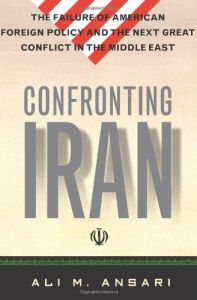Rejoignez getAbstract pour lire le résumé !

Rejoignez getAbstract pour lire le résumé !
Ali M. Ansari
Confronting Iran
The Failure Of American Foreign Policy And The Next Great Conflict In The Middle East
Basic Books, 2006
Aperçu
What brought the U.S. and Iran eyeball to eyeball?
Recommendation
This slightly convoluted book provides tremendous background to help advanced readers understand the complex motives and machinations that shape U.S.-Iranian relations. Unfortunately, professor Ali Ansari has a definite point of view that affects his presentation about Iran's stated nuclear threats and terrorist financing, even as he chides the "trigger-happy Americans" in Iraq. He may be right that the U.S. missed several opportunities to reduce tensions with Iran, but he admits that Iran's overtures were oblique and unpopular. His baroque interpretations of Iran's motives and the relationships among its factions is dizzying, and open to question - ultimately adding to Iran's mystery. Despite its biases, getAbstract considers this important for those seeking a comprehensive overview of Iran and its complex U.S. relations. The book goes well beyond any discussion available in the mass media.
Summary
About the Author
Ali M. Ansari, Ph.D., teaches modern history at Scotland's University of St. Andrews. He has written numerous books and articles on Middle Eastern history and politics. He is a commentator on Iran on CBS, NBC, ABC, CNN, FOX and National Public Radio, and has written for the Financial Times, the Independent (London), and many other periodicals.




















Comment on this summary